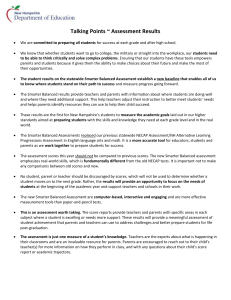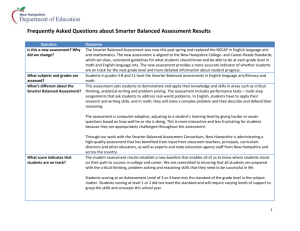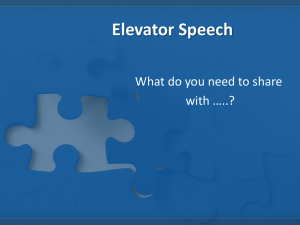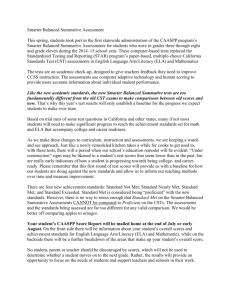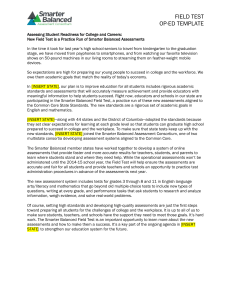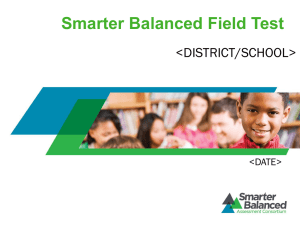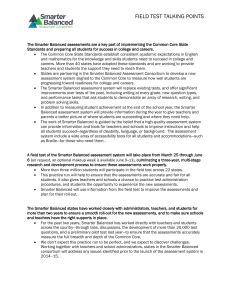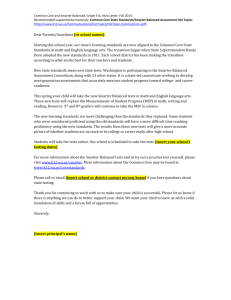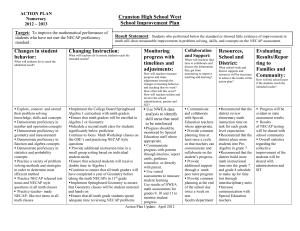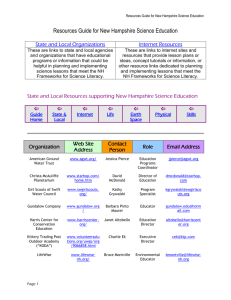NH Key Messages - NHDOE Smarter Balanced Assessment Portal
advertisement
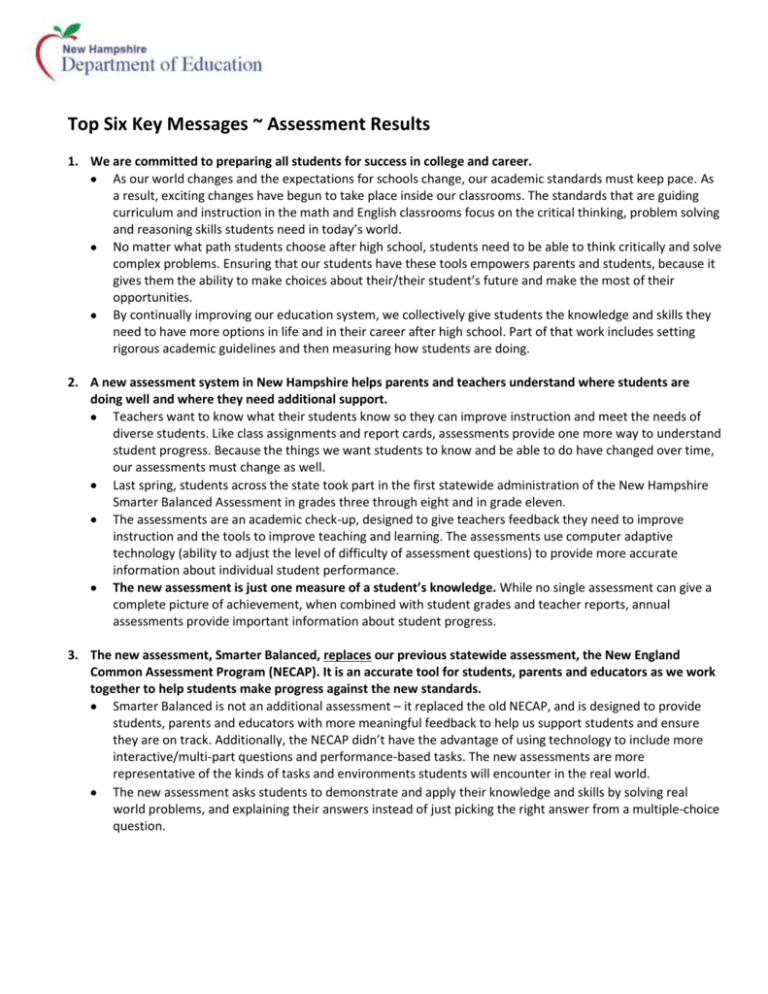
Top Six Key Messages ~ Assessment Results 1. We are committed to preparing all students for success in college and career. As our world changes and the expectations for schools change, our academic standards must keep pace. As a result, exciting changes have begun to take place inside our classrooms. The standards that are guiding curriculum and instruction in the math and English classrooms focus on the critical thinking, problem solving and reasoning skills students need in today’s world. No matter what path students choose after high school, students need to be able to think critically and solve complex problems. Ensuring that our students have these tools empowers parents and students, because it gives them the ability to make choices about their/their student’s future and make the most of their opportunities. By continually improving our education system, we collectively give students the knowledge and skills they need to have more options in life and in their career after high school. Part of that work includes setting rigorous academic guidelines and then measuring how students are doing. 2. A new assessment system in New Hampshire helps parents and teachers understand where students are doing well and where they need additional support. Teachers want to know what their students know so they can improve instruction and meet the needs of diverse students. Like class assignments and report cards, assessments provide one more way to understand student progress. Because the things we want students to know and be able to do have changed over time, our assessments must change as well. Last spring, students across the state took part in the first statewide administration of the New Hampshire Smarter Balanced Assessment in grades three through eight and in grade eleven. The assessments are an academic check-up, designed to give teachers feedback they need to improve instruction and the tools to improve teaching and learning. The assessments use computer adaptive technology (ability to adjust the level of difficulty of assessment questions) to provide more accurate information about individual student performance. The new assessment is just one measure of a student’s knowledge. While no single assessment can give a complete picture of achievement, when combined with student grades and teacher reports, annual assessments provide important information about student progress. 3. The new assessment, Smarter Balanced, replaces our previous statewide assessment, the New England Common Assessment Program (NECAP). It is an accurate tool for students, parents and educators as we work together to help students make progress against the new standards. Smarter Balanced is not an additional assessment – it replaced the old NECAP, and is designed to provide students, parents and educators with more meaningful feedback to help us support students and ensure they are on track. Additionally, the NECAP didn’t have the advantage of using technology to include more interactive/multi-part questions and performance-based tasks. The new assessments are more representative of the kinds of tasks and environments students will encounter in the real world. The new assessment asks students to demonstrate and apply their knowledge and skills by solving real world problems, and explaining their answers instead of just picking the right answer from a multiple-choice question. 4. The scores released from the Smarter Balanced Assessment set a new baseline and should not be compared to previous NECAP scores. The new Smarter Balanced assessment is fundamentally different from the old NECAP tests and therefore, it is important not to make comparisons between old (NECAP) scores and new (Smarter Balanced) scores. This year’s assessment scores set a new baseline for individual students from which progress will be measured. Individual student scores, as well as the school and district results, may look different this year because the assessment measures more complex skills including critical thinking, problem solving and analyzing. These scores cannot be compared to previous test scores since they are focusing on different skills. The results will provide an opportunity to focus on the needs of students at the beginning of the academic year and support teachers and schools in their work. 5. Smarter Balanced is an assessment worth taking and provides much more insight into student performance. The new Smarter Balanced Assessments are computer-based, interactive and engaging and are more effective measurement tools than paper-and-pencil tests. The computer-based assessments will ask students to answer a variety of types of questions, show their work and explain their reasoning. o In math, for example, students won’t just follow procedures, but will demonstrate their understanding of the concepts behind them. They also require students to explain concepts, not just memorize procedures, and accurately select the best mathematical concept or equation to solve real-world problems, and explain why the method or equation they selected is accurate. o In reading, writing, and communicating, assessment questions ask students to apply their understanding to make arguments and examine the logic of others – skills needed to succeed in K-12, college and beyond. The score reports provide teachers and parents with specific areas in each subject where a student is excelling or needs more support. These results provide a meaningful assessment of student achievement that parents and teachers can utilize to address challenges and better prepare students for life postgraduation. Parents need multiple ways to know how their child is doing. This is one additional data set that can help parents know how well their child is doing compared to their peers in their school and in their district, as well throughout the state. Given that our children will compete for jobs across the United States and the world, the earlier we know where a student needs additional help, the better. 6. We are on the right track. New Hampshire’s new statewide assessment system represents the next step in our comprehensive plan to promote high-quality teaching and learning and improve student outcomes. This plan recognizes that assessments can play a role in promoting high-quality instruction. Educators in New Hampshire support these changes because, unlike in other states, the primary purpose of assessment here is to support learning, not to impose high-stakes consequences. In New Hampshire, as we listen to communities, adjustments will always be needed to make lasting progress. Patience and persistence will be required to help our schools continue to succeed during this time of transition. Change is hard, but we know students can rise to meet expectations. We know from states that have already adopted higher standards and began assessing them that initially, student scores start out lower. But as teachers and students gained familiarity with the standards and persevered, there was dramatic improvement.
